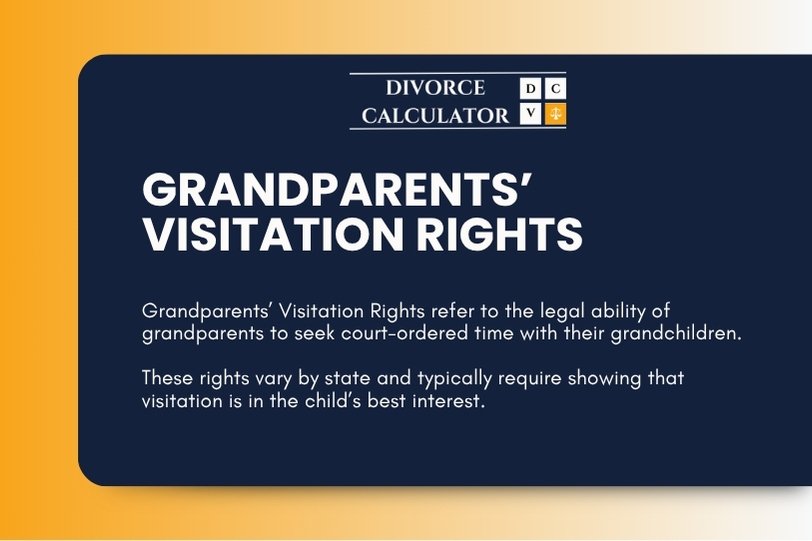Grandparents play a significant role in many families, but sometimes circumstances make it difficult for them to see their grandchildren. Grandparents’ visitation rights exist to ensure that, under certain conditions, grandparents can legally request time with their grandchildren, even if the parents object. These laws vary by state and can depend on several factors, including the family’s current situation and the best interests of the child.
Understanding how these rights work can help us navigate complex family dynamics and legal procedures. It’s important to know what circumstances grant visitation rights and what steps must be followed to pursue them. By exploring the basics of grandparents’ visitation rights, we can make informed decisions for our families.
Key Takeaways
- Grandparents’ visitation rights are not automatic in most states.
- We need to understand that state laws can vary significantly on this issue.
- In many cases, courts place a high priority on parental rights.
Key Points in State Law:
| State Factors | Common Legal Requirements |
|---|---|
| Best Interest of Child | Parental Fitness Considered |
| Existing Relationship | Harm If Denied Access |
When considering a case, judges often look for evidence of an established bond between grandparents and grandchildren.
We should gather documentation of regular contact or involvement in the child’s life.
In situations where parents are divorced, deceased, or otherwise unable to care for a child, our case for visitation may be stronger.
Courts may deny petitions if we cannot show that lack of visitation would be harmful to the child.
Legal assistance is advisable to help us navigate these complex rules.
Filing for visitation can involve formal court procedures and significant paperwork.
Being prepared and understanding our local statutes will help us advocate more effectively for visitation rights.

Why Grandparents’ Visitation Rights Matter In Divorce
When parents go through a divorce, many family relationships can become strained. Our children may lose contact with important figures in their lives, including grandparents. Maintaining these connections supports our children’s emotional stability.
We recognize that grandparents often provide practical help—childcare, transportation, or just a listening ear. Their involvement helps our kids adjust to new routines. This can make transitions between households easier for everyone.
Grandparents can offer:
- Continuity and tradition.
- Emotional support during stressful times.
- Opportunities for extended family bonding.
In certain cases, one parent may limit or prevent contact between children and their grandparents after divorce. Visitation rights help protect the bond between grandparents and grandchildren, even when parents are unable to facilitate those visits themselves.
Often, the courts consider the best interests of the child. We should understand that healthy grandparent relationships can positively impact children’s mental and social well-being.
Respecting grandparents’ roles during and after divorce can help preserve important family relationships for our children. It ensures that children benefit from a broader family support system during significant life changes.
Real-Life Examples
We often hear about cases where grandparents seek visitation rights after a family dispute or a parent’s death. These cases highlight how courts consider the child’s best interest and the role of grandparents.
Case Study Table
| State | Outcome | Key Factor |
|---|---|---|
| California | Visitation granted | Parent deceased |
| Texas | Visitation denied | Parental objection |
| Florida | Limited visits allowed | Child’s preference |
In California, we saw a situation where a grandmother was granted visitation after her son passed away. The court found a strong existing bond with the grandchild, making continued contact beneficial.
In Texas, a set of grandparents requested court-ordered visits after their son’s divorce. However, the court decided in favor of the mother’s wishes to limit contact, emphasizing parental autonomy.
Another example occurred in Florida, where a child’s expressed interest in spending time with grandparents influenced the judge’s decision. The result was scheduled, supervised visits.
These real-world situations show the importance of specific family dynamics and state laws when courts evaluate requests from grandparents. Each outcome depends on the details and legal standards in place.
How States Handle Grandparents’ Visitation Rights
Grandparents’ visitation rights vary significantly by state, as each jurisdiction lays out its own standards and limitations. Courts focus on the child’s best interest, but specific laws and factors differ across New York, California, Texas, and Florida.
New York
In New York, grandparents can petition the court for visitation under specific conditions. These include situations where one or both parents have died or where there is evidence of family disruption, such as divorce or separation. The court requires that visitation is in the child’s best interest.
We must show a substantial existing relationship with our grandchild or demonstrate efforts to establish such a relationship if blocked by a parent. The court evaluates the relationship between the child and grandparents and considers the wishes of the child if they are old enough. Factors include past involvement and any potential harm or benefit of the visitation.
When both parents are alive and united in opposition, courts are generally reluctant to grant visitation unless exceptional circumstances exist.
California
California law allows grandparents to request reasonable visitation when parents are divorced, separated, or if one parent’s whereabouts are unknown. If both parents agree to deny visitation, our chances are limited.
We must prove that a preexisting bond between us and our grandchild benefits the child. The court balances this against the parents’ rights. This is typically called “rebuttable presumption”—meaning courts assume that parental decisions are best unless we provide clear evidence otherwise.
Visitation is not automatically granted; we must usually file a petition and may need to join ongoing family court cases. The process includes mediation, and courts consider factors like the history of contact and potential for disruption.
Texas
Texas grants grandparents rights under strict circumstances. Generally, we can only seek visitation if at least one parent is incarcerated, dead, incompetent, or not living with the child.
To obtain visitation, we must demonstrate that denial would significantly impair the child’s physical health or emotional well-being. Courts in Texas start with a strong presumption in favor of parental decisions, making it a high threshold for us to meet.
The law does not allow us to request visitation if the child has been adopted by someone other than a step-parent or close relative. All petitions must be carefully supported by evidence of harm or a compelling need for the relationship.
Florida
Florida law recognizes grandparents’ rights in a few limited circumstances. If both parents are deceased, missing, or in a persistent vegetative state, we may file for visitation.
If one parent fits these conditions and the other has been convicted of a violent felony or otherwise poses a harm to the child, courts can also consider our petition. Florida emphasizes the best interests of the child and requires evidence that visitation would not interfere with the parent-child relationship.
We must participate in mediation before a full hearing. The burden is on us to demonstrate that visitation is beneficial, and parental wishes will weigh heavily unless there is proof of harm or significant family disruption.
Tips If You’re Dealing With Grandparents’ Visitation Rights
When dealing with grandparents’ visitation rights, it helps to stay informed about our state’s specific laws. Each state can have different standards and procedures, so it’s important that we check official resources or consult with an attorney.
We should document all relevant communication between our family and the grandparents. Keeping a detailed record of visits, conversations, and written correspondence may be useful if legal action is taken.
Open communication with the other parties can reduce misunderstandings. We may want to discuss expectations, boundaries, and schedules early to avoid future conflict.
Negotiation or mediation might resolve disputes before court becomes necessary. While court is sometimes an option, working with a neutral third party can help us find solutions that respect everyone’s role.
Key considerations:
- Prioritize the child’s best interests
- Maintain respectful communication
- Be clear about schedules and boundaries
- Stay organized with written agreements when possible
If we receive legal documents or are summoned to court, seeking legal advice is important. An attorney can help us understand our rights and responsibilities and represent our position effectively.
Frequently Asked Questions
Grandparents’ visitation rights involve complex legal procedures and depend on state laws and changing family circumstances. Courts consider the child’s best interests and the legal standing of grandparents before granting access.
What steps must be taken to establish visitation rights for grandparents in a state?
We need to file a formal petition with the appropriate family court. The process usually requires showing that we have a preexisting relationship with the grandchild and that visitation serves the child’s best interests.
The court may ask for supporting documents or testimony to demonstrate why the visitation should be allowed.
Under what circumstances can a grandparent be awarded visitation rights?
Courts typically award visitation if the parents are divorced, separated, or deceased, or when the child does not live with either parent. In some states, ongoing or past abuse, incarceration, or parental unfitness can also be factors.
We must show that denying visitation would harm the grandchild emotionally or psychologically.
Can a custodial parent lawfully refuse grandparents visitation, and how might the law intervene?
Yes, a custodial parent can refuse visitation, but if we believe the refusal is not in the child’s best interests, we may seek court intervention. In disputed cases, the court evaluates all relevant factors before deciding on visitation rights.
State laws vary, but most require clear evidence that visitation benefits the child.
How has recent legislation affected the rights of grandparents to visitation?
Recent laws have clarified and sometimes limited when grandparents can petition for visitation. Some states have raised the threshold for proving the necessity of visitation, emphasizing parental rights.
Legislative trends focus on balancing a parent’s autonomy with the best interests of the child.
What defines a ‘de facto’ parent and how does this status relate to grandparents?
A ‘de facto’ parent is someone who has acted as a parent in the child’s life, providing daily care and emotional support. This status is not automatically granted to grandparents, but it can apply if we have been the primary caregiver for a significant period.
Achieving this status may strengthen our legal standing in visitation cases.
What legal recourse do grandparents have if visitation rights are denied by parents?
If our request is denied, we can file a petition for visitation with the family court. We may need to provide evidence that continued contact is in the grandchild’s best interests.
If a previous court order exists and is ignored, we can seek enforcement through legal proceedings, which may involve mediation or further court action.



